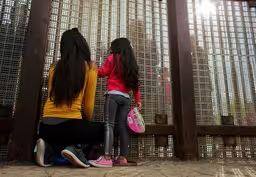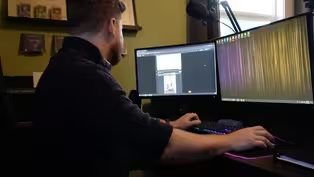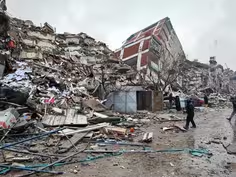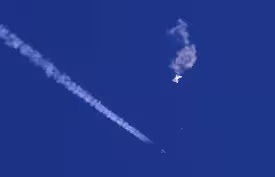
Women in Afghanistan find ways to make their voices heard
Clip: 2/6/2023 | 10m 52sVideo has Closed Captions
Women in Afghanistan find ways to make their voices heard under Taliban oppression
It's been more than a year since the Taliban banned teenage girls in Afghanistan from school. Women there can't attend college, aren't allowed to work with aid groups or go to amusement parks. We’ve been speaking to young girls whose dreams have been stifled and women protesters who have been standing up against the crackdown in the face of serious threats. Nick Schifrin reports.
Problems playing video? | Closed Captioning Feedback
Problems playing video? | Closed Captioning Feedback
Major corporate funding for the PBS News Hour is provided by BDO, BNSF, Consumer Cellular, American Cruise Lines, and Raymond James. Funding for the PBS NewsHour Weekend is provided by...

Women in Afghanistan find ways to make their voices heard
Clip: 2/6/2023 | 10m 52sVideo has Closed Captions
It's been more than a year since the Taliban banned teenage girls in Afghanistan from school. Women there can't attend college, aren't allowed to work with aid groups or go to amusement parks. We’ve been speaking to young girls whose dreams have been stifled and women protesters who have been standing up against the crackdown in the face of serious threats. Nick Schifrin reports.
Problems playing video? | Closed Captioning Feedback
How to Watch PBS News Hour
PBS News Hour is available to stream on pbs.org and the free PBS App, available on iPhone, Apple TV, Android TV, Android smartphones, Amazon Fire TV, Amazon Fire Tablet, Roku, Samsung Smart TV, and Vizio.
Providing Support for PBS.org
Learn Moreabout PBS online sponsorshipGEOFF BENNETT: It has been more than a year since the Taliban banned teenage girls in Afghanistan from school, and women there can't attend college, aren't allowed to work with aid groups or even go to amusement parks.
In essence, they cannot lead normal lives.
We have been speaking to young girls whose dreams had been stifled and women protesters who have been standing up against this crackdown in the face of serious threats.
Nick Schifrin has their stories.
NICK SCHIFRIN: Afghan women are undaunted, but they're hunted.
A woman in the red scarf will call Roya, she and her friends are at war.
The Taliban target her and other female activists who dare to protest, including last August in what they call the Dark Day, one year of Taliban.
We spoke to her by phone and are protecting her identity.
ROYA, Protester (through translator): They beat me and my friends up.
Most of us were held hostage.
They were shooting guns right in front of us, and they were threatening us.
NICK SCHIFRIN: Before the Taliban takeover, she worked in the government.
Her daughters attended school.
They and she lost everything.
She's fighting for the life she once had.
And, for that, she's punished.
ROYA (through translator): They hit my back with the butt of a rifle.
They hit my hands with a whip.
They kicked me too.
Just like me, most of my friends have been beaten up and arrested.
Some of my friends were Taliban hostages for almost a month.
NICK SCHIFRIN: Nevertheless, she persists, demanding change, but suffering immediate blowback.
ROYA (through translator): After every protest, I couldn't go home for almost a month, because there was the possibility of my location being discovered and my getting arrested.
Each time after I protest, I receive calls from anonymous numbers.
They warn me that, if I protest again or come out onto the street, I will be killed or vanished in a way that nobody will be able to understand what happened to me.
NICK SCHIFRIN: And yet her acts of courage create confidence in a younger generation, including this 20-year-old college student we will call Farah.
FARAH, College Student: I'm watching women who are protesting in the streets.
It's a big hope for us.
And if there would be a revolution, absolutely, it will be done by women.
NICK SCHIFRIN: She was studying to become a dentist, but now she's banned from college.
So, the student has become the professor.
She's teaching English at a secret school online.
FARAH: I still have hope.
I am teaching girls who are banned to get an education through online platforms.
I record my voice.
I record presentations.
Our activities are somehow under radar.
NICK SCHIFRIN: And that's what saves her.
Because the Taliban track secret schools, she understands the risk.
FARAH: They can kill me, or they can put me in jail.
They will torture me.
I'm resolved to do it because I believe that these opportunities that I'm providing for girls really deserve it.
They have gotten depression.
They're crying all the time.
NICK SCHIFRIN: Depression is a harsh reality for most young Afghan women.
One we will call Fauzia used to be the happiest girl in school.
Now her hopes have been crushed.
FAUZIA, College Student: This is really, really dark.
And I think that my all wishes and my all dreams are die, and I can't achieve them.
I don't know what to do.
And that really broke my heart.
And it's really bad.
I was, like, girl with big dreams.
I really don't know what will happen.
And I don't see any brightness.
I don't see any light thing in my future.
NICK SCHIFRIN: That darkness is literal for a woman will call Bibi.
BIBI, Protester (through translator): Right now, I'm in a very dark and small room where I'm scared that a Talib could just come at any time.
NICK SCHIFRIN: She too used to be a government employee.
Last year, she protested multiple times.
She says she's willing to sacrifice her blood for freedom.
BIBI (through translator): My family is really scared for my life.
They tell me that: "One day you, will get killed.
Your life is in danger, and we won't even be able to find your body."
But when I think about it, everything I do is worth it.
If my blood brings education or human rights to the next generation of Afghan women, I'm ready to do it.
NICK SCHIFRIN: Now it's not just a fight for human rights.
It's a fight for survival.
This hospital is full of children suffering from pneumonia.
And these parents pray over their own child's grave.
He died last week of hypothermia.
This has been the worst winter in a decade, and two-thirds of the country needs humanitarian assistance.
BIBI (through translator): The situation here is way worse than it is reported in the media.
People are facing extreme poverty and hunger here.
When I go to the bakery to buy bread, people are just like ships lined up outside, men and women waiting for someone to give them bread.
NICK SCHIFRIN: We spoke to the U.N.'s top humanitarian official, Martin Griffiths, before the earthquake in Turkey.
What conditions did you see there?
What conditions do Afghans currently face?
MARTIN GRIFFITHS, U.N.
Emergency Relief Coordinator: It's very -- it's dire.
And there's a reason why Afghanistan is the largest humanitarian aid program in the world in this year, because they have suffered terrible droughts.
They have -- they are experiencing an extraordinarily brutal winter.
Six million people in Afghanistan are close to famine-like conditions, and 28 million need humanitarian assistance.
It's grim.
NICK SCHIFRIN: I don't mean to date you, but you have been working in Afghanistan for four decades.
Have you ever seen conditions like the conditions that Afghanistan faces today?
MARTIN GRIFFITHS: So this is about as bad as it gets, because it's the combination of the effect of climate change, the effect of decades of conflict, and the isolation of Afghanistan, which came along with the Taliban taking over the country a year-and-a-half ago.
So the banking system doesn't work.
You can't make transactions.
People can't access their bank accounts.
They desperately need and depend on humanitarian aid.
NICK SCHIFRIN: The Taliban have banned women from working with domestic and international nongovernmental organizations.
You have called that a potential death blow for your humanitarian efforts in Afghanistan.
Why?
MARTIN GRIFFITHS: Without women working in the delivery of humanitarian assistance, we can't access women and girls.
And women and girls are always our primary target beneficiary for humanitarian assistance and protection.
And, in Afghanistan, that means you must have women working in the front lines of humanitarian organizations.
Otherwise, we won't know if we have reached the right people, understood the assessment of the need, on top of the rights of women, which have been impeded by these edicts.
NICK SCHIFRIN: And so what was your message to the Taliban?
MARTIN GRIFFITHS: The message was, first of all, very clear.
This eject from the 24th of December stopping women and work does you no favors.
It needs to be rescinded.
Two sectors, at least, health and education, have already, since that edict of last month, been exempted from it.
The second message to all those Taliban leaders that I met with my colleagues is, expand those exemptions to the all the sectors that require assistance, whether it's refugees, whether it's basic services, whether it's protection against gender-based violence.
And the reaction from the Taliban was, we understand your concern.
This is a universal response.
And we are, in fact, in the process of preparing guidelines.
And they said, I think you will be positively surprised by those guidelines.
Well, we will have to see.
NICK SCHIFRIN: You said that the Taliban have asked you to be patient while waiting for those guidelines.
You have dealt with Taliban for decades.
Are they just stalling?
MARTIN GRIFFITHS: No, I don't think they're stalling, but patience is not unlimited.
They hope to have these guidelines done and out by March.
I hope so too.
But there's one more thing which needs to happen.
And this is, I think, almost as important.
And that is that the international community needs to engage with the Taliban, across-the-board engagement with the Taliban on all issues, like counterterrorism, like counternarcotics, about the economy, because there are many things that we could do for the people of Afghanistan which has been held back because of the lack of a relationship and engagement with the Taliban.
NICK SCHIFRIN: Washington says that it is not impeding any kind of humanitarian access.
But, of course, the U.S. maintains Afghanistan's foreign reserves frozen in international institutions.
Do you believe the U.S. needs to change its policy and have more engagement with the Taliban and less punishment of the Taliban?
MARTIN GRIFFITHS: My message to the U.S. government is, exercise your leadership to make -- to ensure that Afghanistan is not an isolated, insulated, obscure place, but a place that we understand the positions of its leaders, and that we approve eventually of the ways in which they allow us to help their people.
NICK SCHIFRIN: At the same time, I have talked to other humanitarian officials who believe that you and the U.N. are a little too deferential to host countries, and that they would want you to criticize host countries publicly, rather than keep any criticism private, in the hope that you will maintain your access to the country.
What's your response to some of that criticism?
MARTIN GRIFFITHS: I don't -- I think the record is pretty clear that punitive rhetoric or punishment, they have a pretty poor record of achieving the results that we need to see.
So I am a believer in encouragement and clarity and accountability as a means of engaging.
NICK SCHIFRIN: And regardless of the policy, the people of Afghanistan desperately need help quickly, right?
MARTIN GRIFFITHS: They desperately need help quickly.
Isolation means people die when they need food.
NICK SCHIFRIN: Martin Griffiths, the U.N.'s top humanitarian official, thank you very much.
MARTIN GRIFFITHS: Thank you very much, Nick.
Calls for paid leave grow 30 years after passage of FMLA
Video has Closed Captions
Clip: 2/6/2023 | 6m 28s | Calls for paid leave grow louder 30 years after passage of Family and Medical Leave Act (6m 28s)
Grammy Awards showcase music world and offer up surprises
Video has Closed Captions
Clip: 2/6/2023 | 5m 59s | Grammy Awards showcase music world and offer up surprises (5m 59s)
Hundreds of migrant children remain separated from families
Video has Closed Captions
Clip: 2/6/2023 | 5m 46s | Hundreds of migrant children remain separated from families despite push to reunite them (5m 46s)
Online conspiracy theories led man to mental health crisis
Video has Closed Captions
Clip: 2/6/2023 | 4m 17s | Online conspiracy theories led man to mental health crisis (4m 17s)
Thousands dead in Turkey, Syria after powerful earthquake
Video has Closed Captions
Clip: 2/6/2023 | 8m 33s | Thousands dead in Turkey and Syria after 7.8 magnitude earthquake (8m 33s)
What China is trying to accomplish in U.S. airspace
Video has Closed Captions
Clip: 2/6/2023 | 7m 25s | What China is trying to accomplish with repeated incursions into U.S. airspace (7m 25s)
Providing Support for PBS.org
Learn Moreabout PBS online sponsorship
- News and Public Affairs

FRONTLINE is investigative journalism that questions, explains and changes our world.

- News and Public Affairs

Amanpour and Company features conversations with leaders and decision makers.












Support for PBS provided by:
Major corporate funding for the PBS News Hour is provided by BDO, BNSF, Consumer Cellular, American Cruise Lines, and Raymond James. Funding for the PBS NewsHour Weekend is provided by...





